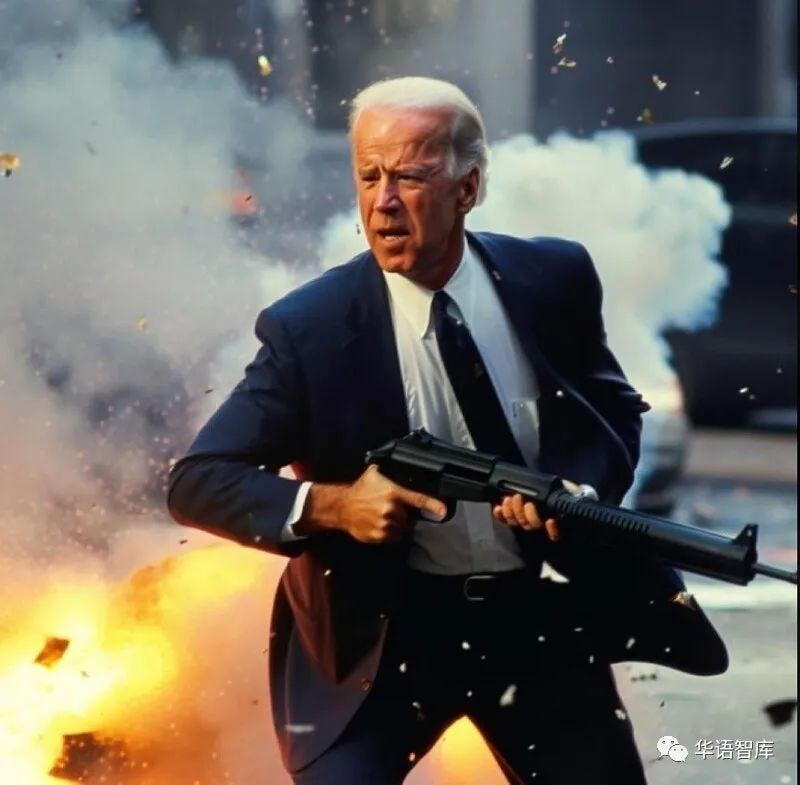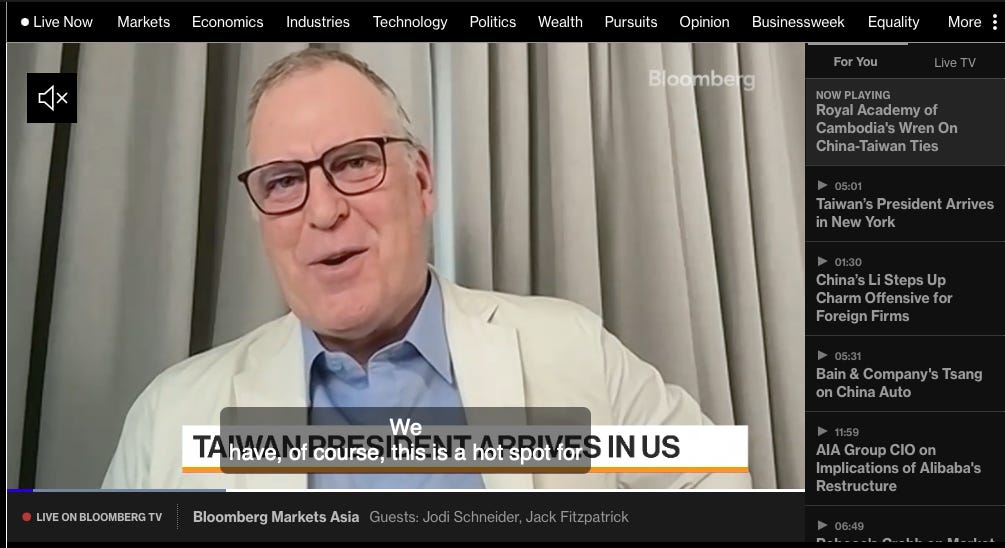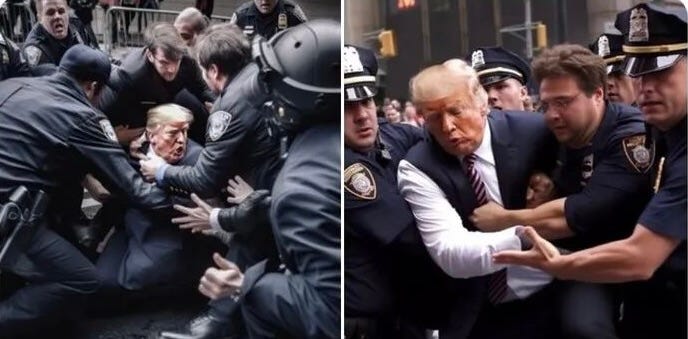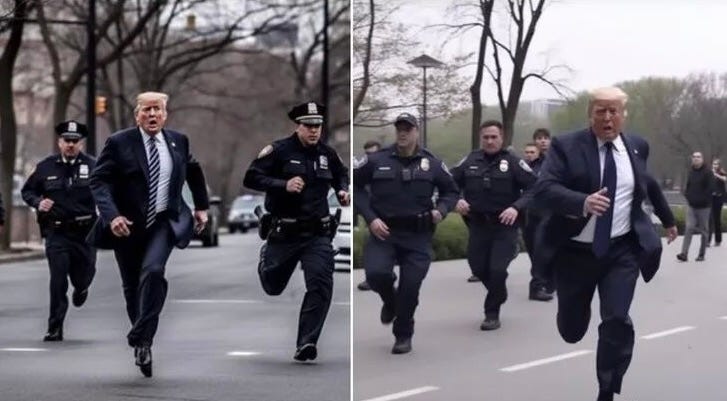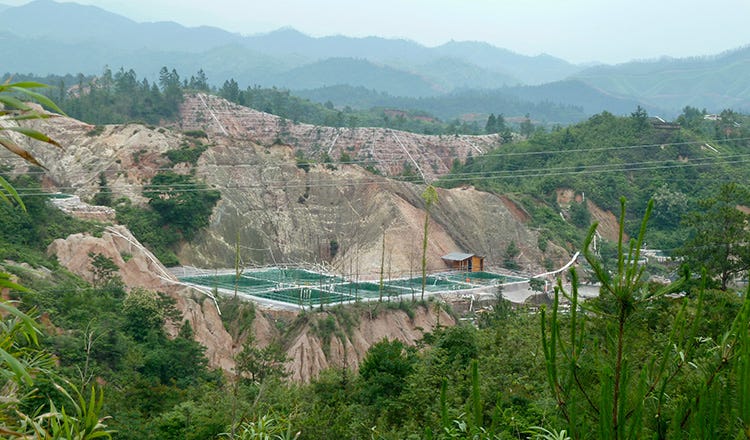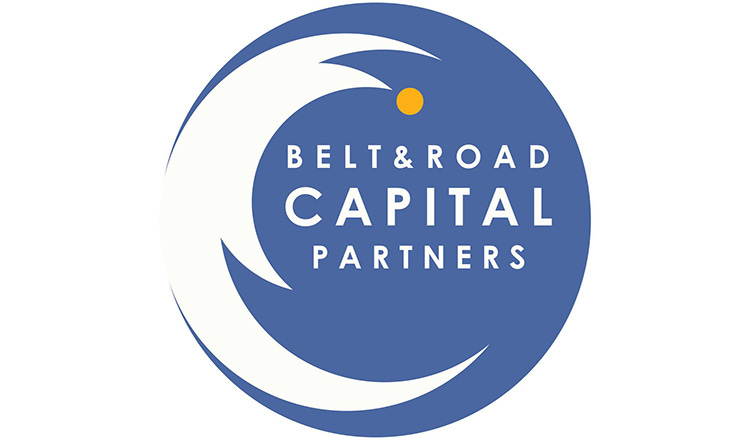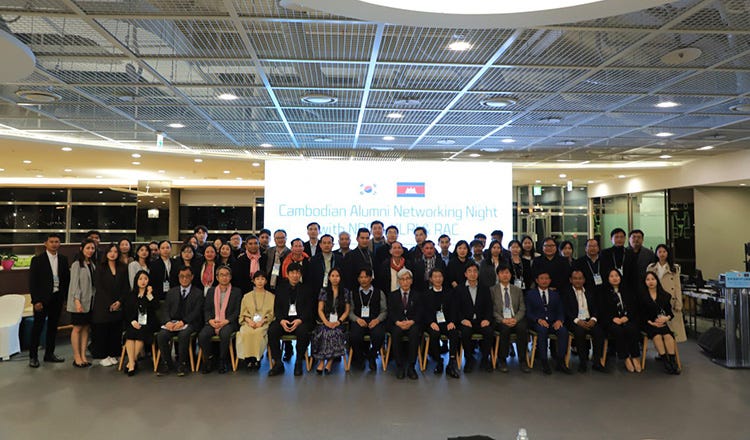Moral Hazard
Biden democracy at gunpoint, Wren on Taiwan on Bloomberg, Trump indictment is indictment of US Republic, fair mining industry transformation, Cambodia's Japan-Korea balance
UPDATE: If the US has taken to heart one big lesson in the 21st century, it is that democracy is not created at gunpoint. The 20th anniversary of the Iraq invasion reminded Americans of that. President Joe Biden’s second summit for democracy, which is taking place this week, is both virtual and surreal.
Royal Academy of Cambodia Special Senior Advisor Digby Wren discusses the possible ramifications of Taiwan President Tsai Ing-wen's visit to the US. He speaks with Haslinda Amin and Rishaad Salamat on "Bloomberg Markets: Asia".
A Manhattan grand jury voted to indict former President Donald Trump on March 30, 2023, for his alleged role in paying porn star Stormy Daniels hush money. Trump lawyer Joe Tacopina confirmed the indictment.
As major producers face the unprecedented pressures, both human rights with due responsibility and carbon footprint concerns have become the focus of mineral supply chain management.
Under the leadership of prime minister Hun Sen, Cambodia is close to China, but has good relations with all countries and keeps a productive balance between Korea and Japan.
Biden’s awkward democracy summit
If the US has taken to heart one big lesson in the 21st century, it is that democracy is not created at gunpoint. The 20th anniversary of the Iraq invasion reminded Americans of that. President Joe Biden’s second summit for democracy, which is taking place this week, is both virtual and surreal. Among the participants are India, which is in the process of jailing opposition leader Rahul Gandhi on a trumped up defamation ruling; Israel, whose leader, Benjamin Netanyahu, wants to shut down judicial independence; and Mexico, whose leader, Andrés Manuel López Obrador, is trying to end free and fair elections. With friends such as these, democracy hardly needs enemies.
Nowhere has the US expended more guns and butter than in the Middle East. The democratic returns have been almost uniformly negative. The Arab world’s only recent convert, Tunisia, was recently lost to a coup d’état. Israel’s democracy, meanwhile, hangs in the balance. That is without mentioning the fact that the Jewish nation state is not exactly democratic with the Arab territories it occupies.
As India’s foreign minister, S Jaishankar, put it last year: “Europe has to grow out of the mindset that Europe’s problems are the world’s problems, but the world’s problems are not Europe’s problems.” What Jaishankar really meant, of course, was the west as a whole. But he was careful to exclude the US, just as Biden is careful not to mention India’s democratic backsliding. Each needs the other to counter China.
When the west can be bothered to listen, the global south’s consistent refrain is for more dollars to help their shift to clean energy, better infrastructure and modern healthcare. Which of the two great powers, China or the US, helps the most is likeliest to shape their political future and foreign policy alignment. One of the by-products of Russia’s invasion of Ukraine is that it has brought this pressing question to the fore.
Biden’s White House is trying to come up with a coherent US approach to the global south, but officials admit it is a work in progress. China has pumped more money into the developing world than all the west combined — with both good and bad effects. Whether the Malis, Cambodias and Bolivias of this world become democracies lies in their hands. The best way of nudging them down that path is to lecture less and listen more.
Read full article here.
Royal Academy of Cambodia's Wren On China-Taiwan Ties
Royal Academy of Cambodia Special Senior Advisor Digby Wren discusses the possible ramifications of Taiwan President Tsai Ing-wen's visit to the US. He speaks with Haslinda Amin and Rishaad Salamat on "Bloomberg Markets: Asia". (Source: Bloomberg)
Watch full video here.
Donald Trump Indictment shows he, like all other presidents, is not an imperial king
A Manhattan grand jury voted to indict former President Donald Trump on March 30, 2023, for his alleged role in paying porn star Stormy Daniels hush money. Trump lawyer Joe Tacopina confirmed the indictment.
The New York Times reported that it is not yet clear what exact charges Trump will face, but a formal indictment will likely be issued in the next few days. Manhattan District Attorney Alvin Bragg is the first prosecutor ever to issue an indictment against a former president. Trump is still the center of several ongoing investigations regarding other alleged criminal activity, including actions he took while in office.
American history is rife with presidents who have used their office to extend executive authority.
Presidents are not kings. George Washington once reflected on this distinction, saying, “I had rather be on my farm than be emperor of the world.”
But American politics and presidency scholars – including me – have long worried about the idea of an imperial presidency – meaning, a president who tries to exert a level of control beyond what the Constitution spells out.
Trump was just another example of a president acting as if he was king by just another name.
Read more here.
Trump indictment won’t keep him from presidential race, but will make his reelection bid much harder
A Manhattan grand jury has voted to indict former President Donald Trump. The specific state charges, reports The New York Times, “remain a mystery” but will be related to the Manhattan district attorney’s investigation of Trump for making hush money payments to a porn star just before the 2016 presidential election.
It’s the first time a U.S. president or former president has been indicted.
At the same time, Trump is expected to continue his campaign for the presidency, seeking to regain in 2024 the position he lost in 2020 to Joe Biden.
Article II of the U.S. Constitution sets forth very explicit qualifications for the presidency: The president must be 35 years of age, a U.S. resident for 14 years and a natural-born citizen.
In cases involving analogous qualifications for members of Congress, the Supreme Court has held that such qualifications form a “constitutional ceiling” – prohibiting any additional qualifications to be imposed by any means.
Thus, because the Constitution does not require that the president be free from indictment, conviction or prison, it follows that a person under indictment or in prison may run for the office and may even serve as president.
Read more here.
Despite Fierce Global Competition over Key Minerals High-Quality Development ensures fair Mining Industry Transformation
As the global energy transformation quickens and adoption of renewables experiences vigorous development, the demand for key minerals has increased exponentially. Thus, the safe and stable supply of key minerals has become a focus of international economic and trade competition. The major developed economies have not only taken advantage of this trend to update their key mineral strategies, but also scrambled to introduce legislation over supply chains, human rights and environmental management. As major producers face the unprecedented pressures, both human rights with due responsibility and carbon footprint concerns have become the focus of mineral supply chain management.
First, voluntary sustainability standards are emerging in the global mining industry and mineral supply chains. Upstream enterprises are facing repetitive cross-auditing, while downstream brands hire two-party auditing companies to conduct multiple audits. Moreover, sector enterprises face penetrating governance of their supply chain auditing and block-chain technology, resulting in legitimate cross-border data transmission and resultant industrial security risks.
Secondly, stakeholders understand that supply chain Environment, Social, Governance (ESG) risks concentrate on mining sources. Many enterprises emphasize supply chain reviews and ignore standardized governance plans and inputs from sources. The lack of joint action across all aspects of the industry chain highlights that enterprises prefer transfer rather than mitigation, which causes negative impacts on the survival and development rights of vulnerable groups that rely on mining sources.
Thirdly, Western countries have successively introduced supply chain legislation related to human rights and environment, which incorporates a wide range of issues including environment, labor, and human rights into the scope of management with due responsibility. This legislation often politicizes human rights’ issues and adopts discriminatory and non-traditional means against specific countries or regions.
The Organization for Economic Cooperation and Development (OECD) has established guidelines with due responsibility and propose a supply chain governance policy of no harm without buying or selling. However, this model is inadequate for addressing ESG risks for conflict minerals.
China, as the largest import, refiner, and export country of key mineral resources, has always been the intermediate link under the greatest pressure. In the past few years, China has assimilated many good management practices, which greatly improved the level of management due responsibility in the mining industry. Meanwhile, enterprises in mineral resource and producing countries have gradually increased awareness of participation in international rules, enhancing their capacity to exercise due responsibility and balance upstream and downstream voices to accelerate new collaborative governance mechanisms for preventing and mitigating social and environmental risks in the supply chain.
Thus, the China Chamber of Commerce for Import and Export of Minerals and Chemicals (CCCMC) and the OECD jointly launched the Responsible Cobalt Industry Initiative in 2016 (RCII). The initiative called for a systematic, inclusive and sustainable approach to addressing supply chain risks. Major upstream and downstream cobalt supply chain enterprises have actively participated. The initiative led a series of work projects, including risk research, standard setting, training, rule negotiation, grievance consultation, community development, crisis resolution, advisory services, etc. The Responsible Cobalt Industry Initiative has helped industry enterprises carry out risk-based management with due responsibility for nearly seven years.
In 2018, the initiative organized global experts to develop the Management with Due Responsibility Standard for the Supply Chain of Cobalt Smelters. The standard was officially released in 2021 after global consulting and testing. Through dissemination and promotion of a global partner network, it has now become an internationally recognized standard in the global cobalt supply chain, filling the industry gap and addressed the ‘industry risk governance without evidence’ dilemma.
A key advance of the Responsible Cobalt Industry Initiative is the creation of a demonstration project for artisan mining and a community livelihood development project in the Democratic Republic of Congo, which actively extended the projects positive experiences to more local areas. The deepening of management practices with due responsibility in mining and supply chain means many more enterprises have reached a consensus on governance.
In order to help more key mineral supply chain enterprises identify, prevent, and mitigate ESG risks, the Responsible Cobalt Industry Initiative has undergone a transformation. On November 28, 2022, the Initiative announced its expansion to the Responsible Critical Mineral Initiative (RCI), which replicates the successful experience of management with due responsibility in the cobalt supply chain into practices of all new energy critical minerals. From March 7th to 8th, 2023, RCI held a plenary meeting in Kunming China, with 32 key upstream and downstream industry enterprises from the supply chain of new energy minerals such as cobalt, lithium, nickel, copper, and mica.
The meeting also served as the official global launch of the RCI. During the meeting. upstream and downstream enterprises jointly analyzed trends and challenges of responsible management in new energy key minerals supply chains. Further in-depth discussion about pain points and response plans were also conducted. In order to advocate co-action among all parties, participating enterprises signed the Joint Action Proposal on Promoting the High Quality Development of Key Mineral Supply Chains, promising to work together to build responsible, resilient, and sustainable key mineral supply chains; adhere to the ‘based on reality’ principle, sharing responsibility, continuous improvement, and addressing both symptoms and root causes; and, take positive and appropriate actions toward high-quality development.
The RCI meeting also reflects the initiatives consistent working methods. These include, uniting multiple stakeholders, creating a globally influential platform for cooperative governance, adopting systematic methods to identify and prevent all kinds of risks, directly or indirectly, and empowering a fair energy transformation.
According to the judgment of RCI, the standardized governance level of the mining industry in key mineral fields will be further enhanced, and the level of management with due responsibility in supply chains will become the core of market competitiveness, in addition to product quality and internal management for enterprises. Hence, it is necessary to fully prepare in advance and enhance the process through six-step framework provided by the China Mineral Supply Chain Management with Due Responsibility Guide.
Thus, we propose:
Upstream and downstream enterprises in the supply chain shall practice responsible business conduct, genuinely understand the principle and essence of risk-based management with due responsibility and comprehensively identify social and environmental risks directly or indirectly caused by supply chain activities.
Strengthen awareness of mission and responsibility to reach a unified understanding, carry out coordinated actions and share common but differentiated responsibilities.
Abiding by international rules and industry standards, continuously improve management with due responsibility performance and operations in entire project life cycle and value chains.
Actively participate in global resource governance, take the initiative to carry out ecological environment protection and integrate the concept of biodiversity into management.
Take effective measures to cope with climate change and make contributions to the green and fair transformation of global critical mineral value chains.
Strengthen participation of all relevant parties and resolve disputes between stakeholders through dialogue, consultation, coordination and cooperation; enhance transparency through information disclosure and strengthen understanding and mutual trust.
Attach importance to knowledge sharing and good practice dissemination and jointly build a responsible, resilient and sustainable mineral supply chain; strive to achieve the 2030 UN Sustainable Development Goals.
Email: beltandroadcapital@gmail.com
Cambodia’s foreign policy strikes a balance between Korea and Japan
By Dr. Seun Sam; policy analyst at the Royal Academy of Cambodia
Under the leadership of prime minister Hun Sen for almost forty years, the kingdom of Cambodia has good relationship with many countries in the world, although there are some people saying that under his leadership Cambodia is too close to China but in reality, Cambodia has good relations with all countries in the world. Cambodia has good relations with the Republic of Korea and Japan while the two countries have not had a smooth relations with each other due to the history in the World War II.
In 1953, diplomatic ties were first established between Japan and Cambodia. Later, bilateral connections were put on hold as a result of Cambodia’s more than 20 years of political unrest and subsequent civil war. Then, in the period leading up to the October 23, 1991, signature of the Paris Peace Accord, Japan actively participated in bringing the warring parties together and facilitating their reconciliation. Tokyo also made a significant contribution to the post-war reconstruction of Cambodia.
The Royal Government of Cambodia has tried their best to make Cambodia to walk on the right track to develop in a sustainable way, particularly in the foreign and private investor’s attraction with the very strong determination in economic reform in order to inspire entrepreneurs either local and international by amending the business laws, reforming public finance, to ensure that it is fit for globalization, in order to protect and enhance businesspeople who come to invest in Cambodia, and to catch good investment opportunities to contribute for the economic development and poverty reduction in Cambodia.
Cambodia and Korea formally established its diplomatic connections in 1997 thanks to the efforts of Prime Minister Hun Sen, who was Cambodia’s second prime minister at the time. With the establishment of diplomatic ties, Cambodia and Korea collaborated in a variety of areas both within the ASEAN association and on a bilateral basis.
Due to their respective histories during World War II, Korea and Japan do not currently have good relations, despite President Yoon of South Korea’s best efforts to change this and his claims that it is crucial for Korea to have a good relationship with Japan. However, the majority of Koreans have not shown enough support for President Yoon’s initiative to improve relations with Japan.
President Yoon of South Korea has frequently emphasized the need to reflect on the past and then work to improve the present in order to better the future. Being one of the developed nations that shares nearly the same common sense as Korea, President Yoon is aware of how crucial it is for Korea to cooperate with and maintain strong relations with Japan. North Korea conducting frequent missile tests is extremely risky for both Japan and Korea, which both oppose it. China is also a reliable ally and a fierce foe of the two nations, which implies that China is both needed and despised by them at the same time.
It should be noted that Japan and Korea remain the America’s closest allies in Asia, and both countries continue to host US military personnel. If their pals get along well with one another, the United States of America will be quite happy.
Given that Vietnam and China currently have poor relations with one another as a result of their shared border disputes, it is difficult enough for Cambodia to maintain a balance in its foreign policy between the two countries. But the two countries get along well with Cambodia.
Since Cambodia is a small country that has experienced numerous invasions and civil wars, it is aware of how difficult it is to live in an environment where there is animosity or to avoid bombs when there is combat. As such, the Kingdom of Cambodia, which is friendly with both Korea and Japan, would be delighted to see improved relations between the two countries.
Overall, Cambodia needs to strengthen its diplomatic capabilities and make sure that it chooses the best qualified individuals to serve as its ambassadors abroad. At this point, it is crucial for Cambodia to choose ambassadors from a pool of eligible applicants at various levels. The capacity to engage with partners and stakeholders as well as the capacity to represent Cambodia abroad are crucial for Cambodia. Last but not least, it is crucial for Cambodia to promote internal harmony, stability, development, and capacity building across the board.
Read original article here.




